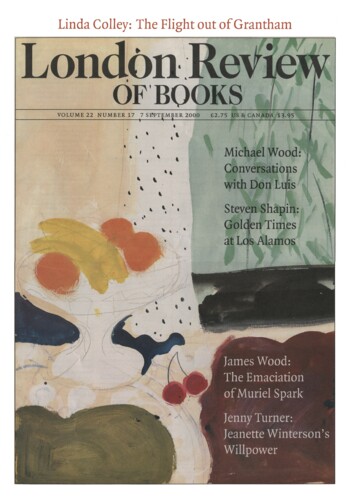There’s been a bit of fuss recently over whether, and with what definition, the word Blairism should appear in new dictionaries. The Compact Oxford found no room for it, saying that the word must pass the test of time. The compilers of the New Penguin were braver, but, it seems, had a devil of a time choosing an appropriate definition. One happy draft referred to ‘the absence of a fundamental underlying ideology’ and ‘close attention to prevailing public opinion’. Unfortunately the final words chosen were more bland: ‘especially regarded as a modified form of traditional socialism’. A letter in the Guardian pointed out that Oliver Wendell Holmes defined blairing in 1858 as ‘polishing into correctness and smoothness’ (after the philosopher Hugh Blair, 1718-1800), which seems closer to the mark. Perhaps the Penguin compilers should also have reached for their Robert and looked up the French verb blairer, as in je ne peux pas le blairer (‘he gives me the creeps’).
Those easily offended should on no account read the following quote:
This was not a young man making love to a girl. This was the meeting of twin souls. The light covering of flesh was so transmuted with ecstasy that early passion became a heavenly embrace of white fiery flame. There are joys so complete, so all perfect, that one should not survive them. Ah why did not my burning soul find exit that night, and fly, like Blake’s angel, through the clouds of our earth to another sphere?
These alarming words helped to ensure the banning of Isadora Duncan’s autobiography in 1928. Readers who want to revel in such smut on a park bench or on the train can hide Alan Travis’s forthcoming Bound and Gagged: The Secret History of Obscenity in Britain (Profile, £16.99) behind the generously proportioned pages of the LRB.
Anyone churlish enough to suggest that today’s authors don’t earn their whopping advances should consider the sentence of hard labour that is the summer/autumn literary festival circuit. David Starkey – to take an almost random example – is talking about his bestselling Life of Elizabeth I not only at the Rye Festival this month (his session’s already sold out, I’m afraid), but at the Ilkley Literature Festival on 7 October, the Cheltenham Literature Festival on 21 October, the Southwark Festival on 31 October and probably at numerous other carouses, too. He should really sell ‘Starkey on Tour’ T-shirts with the dates on the back – perhaps he does. What a literary festival has over a run-of-the-mill bookshop reading is, of course, the chance to see and hear David Starkey cheek by jowl with Zadie Smith, Roy Strong, Terry Jones, Michael Holroyd and all the other writers showcasing their various talents this year. Such events certainly seem to be increasing rapidly in number and variety. Cheltenham and Hay-on-Wye (Tony Benn: ‘In my mind, it has replaced Christmas’) are well enough known, but there’s also Swindon, Sole Bay, Clerkenwell (perhaps the hippest – it had Alex from Blur and Adam and Joe), Dartington Hall, Lancaster Litfest, The Word 2000 and so on and on. I’m sorry to report that neither the Lockerbie Festival nor the Grayshott and Hindhead bash (both September fixtures) will be held this year, the latter because the Millennium celebration was thought to be quite enough. But there’s always the Graham Greene Festival, the Sherlock Holmes rave or the annual Dickens Festival in Broadstairs, which offers the treat of dozens of besuited and bonneted fictional favourites parading through the town.
Nick Page has spent years searching out literature of ‘breathtaking dreadfulness’, and publishes his compilation, In Search of the World’s Worst Writers, with HarperCollins next month (£8.99). Before you get too excited, Page has thought better of including anyone still alive, but here is a taste of the work of the writer he considers the all-time stinker (it would spoil it for Page, I think, for me to reveal the name):
He counted the seconds and on reaching fifty-nine she clasped him in her trembling arms – shouting:
‘I will – I will marry you, Lord Raspberry.’ She then fell fainting at his feet. He placed the little figure on a couch, ran for some brandy and raising her gently applied the stimulant. Soon, however, she rallied – screaming – shouting – laughing – weeping alternatively.
Alternative weeping sounds like something that might go on at the Clerkenwell Festival.
Send Letters To:
The Editor
London Review of Books,
28 Little Russell Street
London, WC1A 2HN
letters@lrb.co.uk
Please include name, address, and a telephone number.

